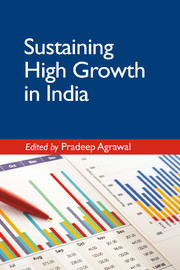Book contents
- Frontmatter
- Contents
- List of Tables
- List of Graphs and Maps
- Preface
- Introduction
- Section 1 Ensuring Macroeconomic Stability for Sustaining High Growth Rates
- Section 2 Promoting Industrial Development for Sustaining High Growth Rates
- Section 3 The International Economic Issues and Sustaining High Growth
- Section 4 Infrastructure Bottlenecks to Sustaining High Growth
- Section 5 Some Socio-political Issues in Sustaining High Growth
- 13 Demographic Dividend and Economic Growth in India and China
- 14 Does Social Cohesion Limit Uncertainties in Economic Growth? A Pre-and Post-reform Analysis from India
- 15 Does Openness and Democracy Reduce Corruption? Results for South Asian Nations and India
- 16 Regional Dynamics of Rural Credit and Growth in India: Exploring Nonlinearity and Convergence in Growth Patterns
- List of Contributors
- Obituary
- Index
14 - Does Social Cohesion Limit Uncertainties in Economic Growth? A Pre-and Post-reform Analysis from India
from Section 5 - Some Socio-political Issues in Sustaining High Growth
Published online by Cambridge University Press: 08 February 2018
- Frontmatter
- Contents
- List of Tables
- List of Graphs and Maps
- Preface
- Introduction
- Section 1 Ensuring Macroeconomic Stability for Sustaining High Growth Rates
- Section 2 Promoting Industrial Development for Sustaining High Growth Rates
- Section 3 The International Economic Issues and Sustaining High Growth
- Section 4 Infrastructure Bottlenecks to Sustaining High Growth
- Section 5 Some Socio-political Issues in Sustaining High Growth
- 13 Demographic Dividend and Economic Growth in India and China
- 14 Does Social Cohesion Limit Uncertainties in Economic Growth? A Pre-and Post-reform Analysis from India
- 15 Does Openness and Democracy Reduce Corruption? Results for South Asian Nations and India
- 16 Regional Dynamics of Rural Credit and Growth in India: Exploring Nonlinearity and Convergence in Growth Patterns
- List of Contributors
- Obituary
- Index
Summary
INTRODUCTION
Economic growth without a social limit is unthinkable. The latter – as argued and conceptualized in the literature in terms of ‘social cohesion’ – demonstrates that it can lend stability to the observed volatility in output growth in any economy – developed or developing. A cohesive system can have higher correlation of growth uncertainties across space, whereas an incohesive system can produce lower correlation of growth volatilities across spatial units, requiring different policies for different states/regions to achieve overall stability in a country. Literature (Easterly et al., 2006) has also demonstrated that persistence of social cohesion, per se, can infuse confidence in the socio-economic system so that the latter can withstand spurts of endogenous and exogenous shocks arising from within or outside the economic system of any country. This issue is nowhere more important than in India which has recently experienced unprecedented rise in both economic growth and socio-economic inequality at various strata of the historically driven heterogenous social orders. It is possible that the agent of change that seems to have forced dual existence of inequality and high growth in India could also be the agent of agony that may force unsustainability of monotonic high growth in the long run, apparently without the ‘social limit’. Surprisingly, the volume of research (both theoretical and empirical) that has appeared in this regard since Hirsch (1976) has been far from phenomenal – at least in light of the frequent debates and dialogues on social, political and economic implications of social cohesion (or the lack of it) on long-term economic growth and planning (Easterly et al., 2006, for a succinct survey). Under this backdrop, the exercise undertaken in this chapter has two broad aims: (i) to explicitly introduce the role of social cohesion as a formidable agent of ‘social limit’ towards a better understanding of growth– cohesion nexus in India (ii) to introduce new analytical framework, missing in the extant literature so far, to model and endogenize the effects of social cohesion in predicting dynamics of long-term economic growth and planning.
- Type
- Chapter
- Information
- Sustaining High Growth in India , pp. 417 - 464Publisher: Cambridge University PressPrint publication year: 2017



